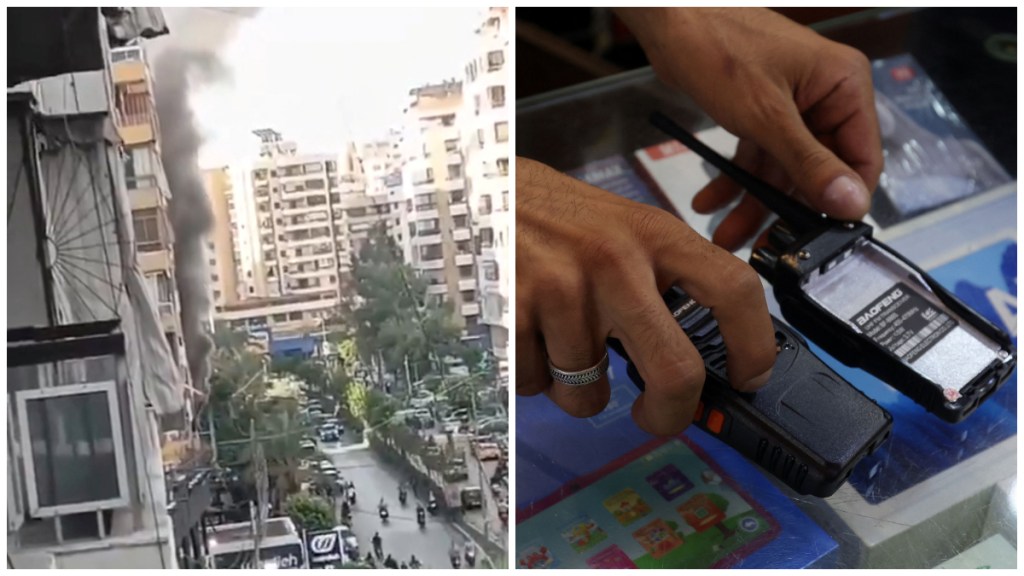Lebanon blasts: Just a day after a deadly attack involving pagers used by Hezbollah members, a new wave of explosions rocked Lebanon on Wednesday, heightening fears of escalating conflict in the region. This series of planned attacks has raised significant concerns about civilian safety and the potential for an all-out war between Israel and Hezbollah. Both attacks are widely suspected to have been orchestrated by Israel which gives an indication of a full-scale war. The sophisticated and planned nature of these events raises significant questions: What transpired during these two distinct waves of violence, and what might lie ahead for a region already on edge?
A day after devastating pager explosions hit Hezbollah members, Lebanon was shaken once again on Wednesday by a fresh wave of blasts, intensifying fears of a deepening conflict.
Overview of the Attacks
On Tuesday, pagers utilized by Hezbollah operatives detonated almost simultaneously in Lebanon and Syria, resulting in the deaths of at least 12 individuals, including two young children, and injuring thousands. According to an anonymous American official, the explosives were discreetly hidden within the devices, pointing towards a well-planned operation. Both the Lebanese government and Hezbollah attributed the attacks to Israel, although the Israeli military has remained silent on the matter.
Following this initial attack, further explosions occurred on Wednesday, particularly at a funeral in Beirut for three Hezbollah members and a child killed in the previous day’s incident. This second wave resulted in at least 20 additional fatalities and over 450 injuries, according to the Lebanese Health Ministry. Israeli Defense Minister Yoav Gallant alluded to a “new phase in the war” but did not mention the explosions during his address to troops.
Types of devices targeted
Hezbollah officials reported that walkie-talkies used by the group were among the devices that exploded in the second wave of attacks. Additionally, solar energy systems in various homes across Beirut and southern Lebanon were also implicated, with reports of at least one girl sustaining injuries. The extent and nature of these devices suggest a focused attempt to compromise Hezbollah’s communications infrastructure.
Hezbollah has historically relied on pagers to avoid Israeli surveillance, as they operate on a different, less vulnerable network than mobile phones. However, the recent attacks demonstrate a significant vulnerability in their communication strategy.
Origin of the Devices
The pagers that exploded were reportedly procured over six months ago, though how they arrived in Lebanon remains unclear. A Taiwanese company, Gold Apollo, confirmed that their AR-924 model was used, but Hungarian officials indicated that the devices had never been exported to Lebanon. This ambiguity raises questions about the supply chain and the potential involvement of state actors in introducing compromised technology.
Experts suggest that the devices used in the attacks might be counterfeit, as the walkie-talkies involved are not from a reputable manufacturer. This adds another layer of complexity to the investigation, as the origins of these devices are still being scrutinized.
Mechanism of the Attacks
The sophisticated nature of the attacks indicates a high level of planning and resource allocation. Experts believe that small explosive devices were embedded in the pagers before they were delivered to Hezbollah, likely triggered remotely. A former British Army bomb disposal officer explained that the design of a pager allows for easy modification into a detonating device, further underscoring the technical capabilities of the attackers.
Some analysts speculate that Israel’s Mossad could be behind the operation, as it aligns with the agency’s history of executing similar covert missions against perceived threats. The scale and precision of these attacks imply extensive intelligence gathering over a prolonged period.
Implications for Regional Security
The ongoing conflict between Israel and Hezbollah has been exacerbated by these recent events. The nature of the attacks not only endangers Hezbollah operatives but also places countless civilians at risk. With the potential for further escalations, the international community watches closely, fearing that these incidents could trigger a broader military confrontation.
As investigations continue, questions remain about the implications of these sophisticated attacks and the extent to which technology can be manipulated for destructive purposes. The situation in Lebanon is increasingly precarious, and the repercussions of these explosions could resonate far beyond the region.
(With AP Inputs)


